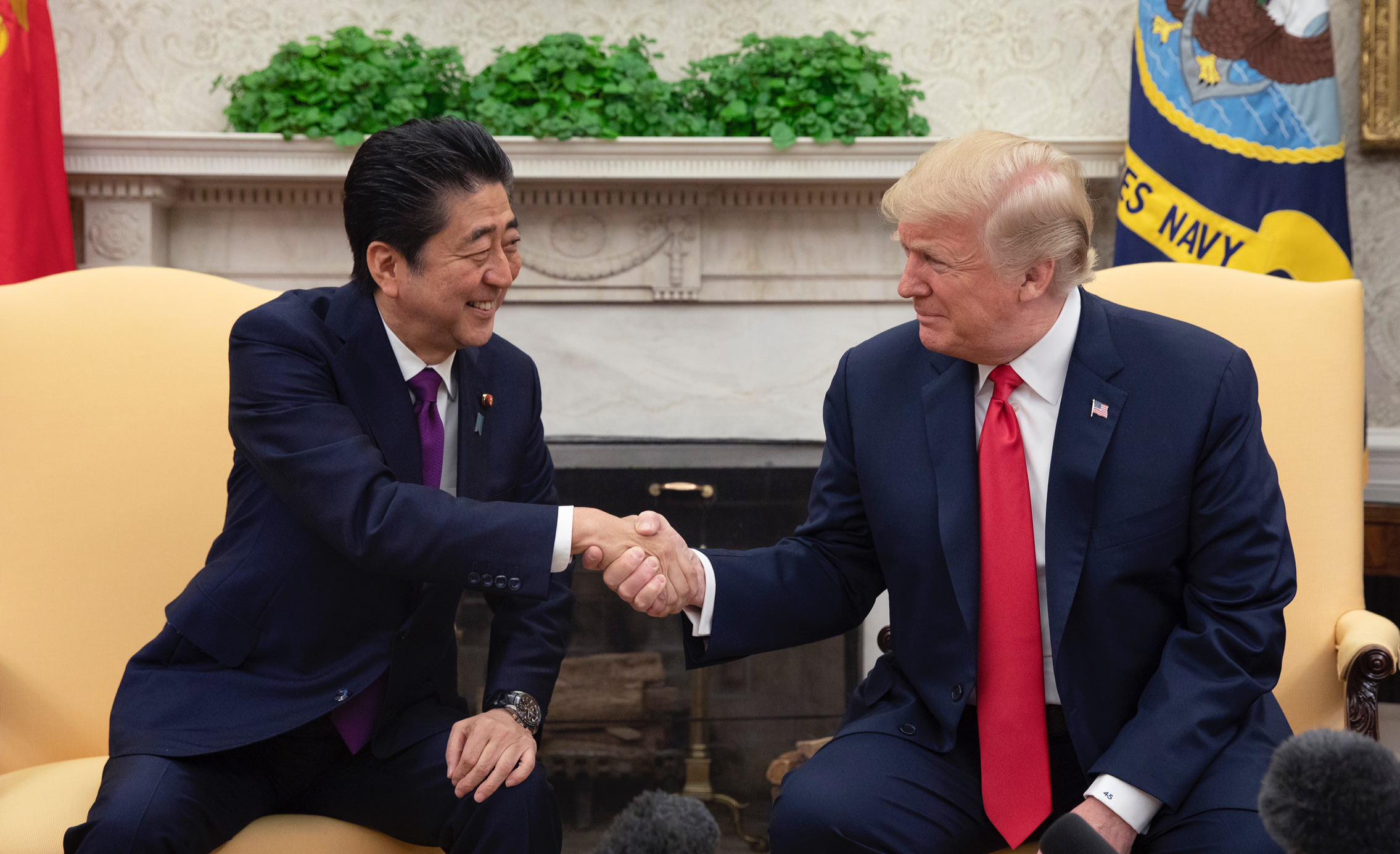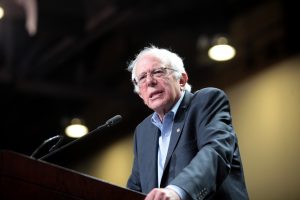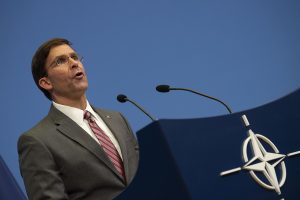by Graham Fuller
If the rise of strong new powers like China poses a challenge to the older US-dominated geopolitical order, what about about the converse? The challenge to the international order created by a declining and erratic great power ever more at odds with an emerging new order— even without Trump?
Every day the headlines reveal a sense of the decay of American geopolitical power and influence. Some of this is due to the natural rise of other nations like China, Russia, India, Turkey, and Brazil as important new players. But much of it is also due the the collapse of the logic of American empire, the massive US foreign policy blunders of the past three decades, and the brutal deprivations that these losing wars have exacted upon the American political, economic and social order—not to mention upon the overseas victims of those wars.
The mercurial and disastrous nature itself of so many Trump administration policies tends to mask the deeper roots of this self-generated decline. How easy, even comforting, and ultimately dangerous it is to lay it all on figure of Donald Trump. Such focus on his personal failings fosters the illusion that Trump himself is basically the problem and that his departure will thus lead to fixing these problems. It will not. Their roots lie far deeper. In foreign policy they trace back at least to the collapse of the Soviet Union and the so-called “unipolar moment” when the US embraced the idea that it was now the world’s sole superpower, capable of establishing long-term unchallenged global hegemony. Remember how this was to herald the coming “American Century?”
Most of the US foreign policy elite still embodies these notions. They perceive US hegemony as the natural state of affairs, perhaps even God-given; any views that work against that belief are alien, naive about the nature of the world, ideologically unacceptable, or even treasonous.
We see this in the elite views all across the mainstream media starting with Trump’s meeting with Kim Jong Un in early 2018. We see it in the fervent voices singing from the hymn book of the foreign policy establishment against Trump’s decision to pull out remaining US troops from Syria. Or in any efforts to overcome the truly dangerous deterioration of US relations with Moscow—in which Washington finds it inconceivable that any element its own policies could have any kind of causal effect on such deterioration.
Now, I am well aware of Trump’s ignorance about foreign affairs, among his many other failings. Typically so far the meeting with North Korea’s leader has been widely denounced as unproductive and naive. For sure there is not going to be any major North Korean denuclearization in the near future, but the Korean Peninsula has already changed markedly. Relations between North and South Korea are now on a vastly different footing today compared to a year ago; bombast and threats of nuclear exchanges have given way to cautious rapprochement. South Korea is taking some calculated risks in this process, but it is proceeding apace with cautious but fairly broad public approval there. The Korean Peninsula is starting to calm.
The downside? The US military presence in South Korea is certainly headed for termination if things continue to go well between the Koreas. A key US geostrategic base in East Asia will be lost. But for Koreans, indeed for most of the world, should Korean steps towards normalization and perhaps eventual reunification be seen as a negative step? Perhaps it is in the eyes of US policy elites that still cling to the illusion of permanent US stewardship over global geopolitics, even on China’s doorstep.
There is of course a Japanese factor. Tokyo will likely draw the minimal conclusion that it will need to improve and deepen its bilateral relations with China rather than depend over the next decades in hiding behind US strategic skirts. But isn’t Japan, a powerful state in its own right, destined to come to terms with Chinese reality on its own terms? Should the US remain permanently engaged in working against the evolution of more “normal” regional power relationships in East Asia? Is US foreign policy permanently committed the maintenance and manipulation of international conflicts?
Syria is the latest hot button issue in Washington in which conservatives, most liberals and foreign policy professionals seem to unite in condemning Trump’s decision to pull out America’s small number of troops from the Syrian morass. But does the US military presence in Syria actually facilitate some gradual restoration of peace in Syria—an end to the killing and refugee flows? Yet what headlines do we see? “Trump’s Christmas gift to Putin,” “US loses its place in Syria,” “Who lost Syria?”, “Iran and Russia big winners in Syria” and other such stories dominate American mainstream commentary.
Much of the hostility to the Syrian pullout is unfortunately based on automatic political opposition to anything that Trump does, in order to weaken him. Others bemoan this further step away from a once dominant US position in the Middle East. Yet here we must ask whether US domination of the Middle East —involving strong support for autocratic rulers, military invasions, bombings, special operations, destruction of infrastructures, deaths of upwards of a million Muslims— has done anything at all good for the region in the past many decades. At best these policies now serve the ill-conceived political goals of Israel and Saudi Arabia. Do we really believe that neighboring Iran andTurkey, or Russia and China can be permanently excluded from roles as major regional players there? Does everything have to be a proxy war?
Afghanistan may well be the next arena of withdrawal. The longest war in American history has gone nowhere. Does the US really harbor a national mission to stand guardian in Afghanistan in perpetuity? Remember, although the ostensible reason for the invasion of Afghanistan was to destroy al-Qaeda—which never quite took place—the real geopolitical goal was to establish American military bases in the heart of Asia on the very doorstep of Russia and China. (Can we conceive of the US reaction to a Russian or Chinese effort to establish military bases in countries neighboring the US?)
Some will take issue with my views here. They believe the US, as an “exceptional nation,” has the right, nay the duty, to serve, indefinitely and unchallenged, as policeman to the world. (“Bringing democracy to the world” is the favored characterization.)
But yet, to give these critics their due, there is indeed a legitimate and deeper geopolitical question to be posed here—involving one’s understanding of the nature of international politics. Does the global order really require the permanent presence of some kind of a policeman? If yes, then in the event of US abdication or incapacity to serve as global policeman, must another nation inevitably take its place? Or should there be a global policeman at all? Indeed, is the evolution of a multipolar international order the inevitable and desirable future of the international system?
I see little prospect of US relinquishing its self-appointed role as global policeman for a long time to come, even as its policies founder. Sadly, it seems as if the US is in the process of inflicting massive damage upon itself, as did Rome and Britain and many other empires before, by draining its life blood and fortune in feckless international military interventions—all proclaimed “essential.” The opportunity costs of the US military budget—bigger than the next five nations put together—robs money that should go to decaying US infrastructure, public transportation, sustainable income distribution, a drastic reduction to the political power of the “military industrial complex,” failing health care, the building of civilian sciences, free higher education, and fostering social harmony. It seems like China itself is investing heavily in many of these socially productive spheres even as the US prefers to put its money into building geopolitical alliances and preparing for conflict.
Why are so few at home challenging the view that the US mission in the world is to intervene anywhere, everywhere, all the time—and primarily in the interests of maintaining US international hegemony? We seem reluctant to acknowledge that we live in a more complex world that requires a sharing of international responsibilities. Can we really believe that the future of Afghan politics really matters more to the US than it does to Afghanistan’s immediate neighbors of Russia, China, Pakistan, Iran and India? Is “permanent war” and permanent military intervention the path to keeping America great?
We can argue over the details, the fine print, and the timing of gradual disengagement from a large number of international conflicts. Yet, however feckless the Trump administration and its style may be, perhaps we should consider carefully whether at least one of Trump’s default instincts—gradual American disengagement from myriad unending US overseas military commitments—might have some merit. Foreign policy must consist of something more than perpetual identification of enemies, and perceptions of “threats”—long a special and costly cottage industry of Washington.
Ironically for Trump, some of his inchoate foreign policy instincts are shared within what passes for the “American left.” Whatever Trump does in this area, and whether he is “allowed” to do so by the entrenched foreign policy bureaucracy, it will likely take more than a generation to wean that powerful establishment, or “deep state,” away from reflexive US interventionism. But maybe we are witnessing a start.
Graham E. Fuller is a former senior CIA official, author of numerous books on the Muslim World; his first novel is “Breaking Faith: A novel of espionage and an American’s crisis of conscience in Pakistan;” his second one is BEAR. (Amazon, Kindle). Reprinted, with permission, from grahamefuller.com.






Thanks for the wise analysis! In fact US should focus of it’s role in a future multilateral world and invest on the related infrastructure instead of investing in those designed to explode and create the ‘Fear ‘ that they think is needed to assure US economical superiority. It is a market men! And the prices cut through more than any blade! The world would be rulled by WTO like systems which are designed based on sustainablity to which some political branch would be added, not by guns! You are just putting your investment in fire of militarism when the others are doing more wisely!
Good to read this analysis. Fuller notes, “We can argue over the … timing of gradual disengagement from a large number of international conflicts.” One example of where the ‘timing’ of a potential disengagement is important is the Korean peninsula. Fuller writes with apparent concern, “The US military presence in South Korea is certainly headed for termination if things continue to go well between the Koreas.” One can argue that the ROK will want US military presence as long as DPRK maintains its nuclear deterrent. And, as Fuller writes, correctly, “For sure there is not going to be any major North Korean denuclearization in the near future.” That is going to take a long time, so there is no immediate or even near term probability that US forces will leave South Korea, unless this US President decides otherwise.
With due respct mr fuller this is rather wishful thinking Trump and his war party just pulled a nice one to get rid of barrier Mattis and after all the noise on syria withdrawal now are singing even a tougher leitmotif to stay for years adding to their conditions while simultaneously beefing up in Persian Gulf and reraising chemical weapons hoax. I only see a lurch toward Bushist war please stop deluding yourself.
Outstanding article, and antidote to the talk from our foreign/military policy establishment and its hangers on about America’s worldwide responsibilities to maintain order. That constant talk can best be understood as a claim to personal and institutional importance to exercise those “responsibilities.” The trouble is, this is done with disregard of the well-being of the mass of citizen, and the enormous waste of money. As that self-appointed policing role becomes less plausible with the inevitable rise of previously weak states, the claim to it becomes shriller and the waste of resources greater. A dangerous state of affairs.